THE WEEK IN CORONAVIRUS
Due to an exceptionally early mid-afternoon press time for this edition, the week’s closing Covid-19 data was unavailable but the death toll reached 116,000 on Tuesday amid a continuing pattern of increasing cases of contagion with the delta variant now predominant but less people in intensive care and daily fatalities down to 20 or so with less than a quarter of the population now lacking any vaccination. The week and month began on Monday with Argentina opening its frontiers to tourists from all countries with complete vaccination and a negative PCR test. Booster vaccinations of risk groups aged over 50 also commenced. On Wednesday there was good news for Buenos Aires Province when India’s Covaxin (of which the provincial government contracted 10 million doses) was approved by the World Health Organisation (WHO). Meanwhile, Domestic Trade Secretary Roberto Feletti summoned lab representatives on Thursday to propose price controls on medical drugs or even a freeze.
ALBERTO ABROAD
The G20 summit in Rome over the weekend and the COP26 United Nations conference on climate change in Glasgow kept President Alberto Fernández out of the country until midweek. The presidential agenda in Rome was limited to a single-minded pursuit for more flexible conditions for the repayment of Argentina’s gigantic US$44-billion debt with the International Monetary Fund but a meeting with IMF Managing Director Kristalina Georgieva made little headway with the Fund insisting on a plan and Foreign Minister Santiago Cafiero on “the best agreement possible” while the closing G20 statement did not go beyond “continuing discussion” of IMF interest rate surcharges. Fernández also sought out photo-ops with G20 heavyweights like United States President Joe Biden and outgoing German Chancellor Angela Merkel, among other world leaders. While the debt issue also weighed heavily in Glasgow, there was announcement of a green hydrogen plant for Río Negro with some US$8 billion of Australian investment over the next decade – the construction of the plant will not be completed before 2024, however, and the conditions have yet to be worked out. On Tuesday the president was invited to address a methane panel organised by the United States (an agreement to reduce emissions of that gas by 30 percent was perhaps the main achievement of COP26 although shunned by such giants as China, India and Russia among others) but his speech centred almost entirely on Argentina’s need for debt relief. Throughout his absence the presidency was entrusted to Vice-President Cristina Fernández de Kirchner (with Thursday’s hysterectomy already scheduled) but her stewardship was entirely passive.
CRISTINA IN HOSPITAL
After being acting president for the first half of the week, Vice-President Cristina Fernández de Kirchner was subjected on Thursday to a hysterectomy at Otamendi Hospital where she will remain for now for observation. In the course of the operation lasting over two hours the surgeons detected a benign polyp with no danger of cancer. A Friday update said she was recovering well. Frente de Todos postponed their closing rally (which had been scheduled for today) in the hope of the Kirchnerite leader having recovered and being able to attend. Coincidentally, the vice-president was on the same floor as former first lady Hilda ‘Chiche’ González de Duhalde (recovering from a spinal operation), her senatorial rival in the 2005 midterms. The vice-president’s operation did not stop Juntos por el Cambio deputy Graciela Ocaña (seeking re-election to Congress next Sunday) from going to court the previous day to dispute Cristina Kirchner’s right to a double privileged pension (as an ex-president and as a presidential widow) totalling 2.8 million pesos. Also on Wednesday both Cristina Kirchner and her children Máximo and Florencia requested their acquittal in the case of money-laundering via their Hotesur Patagonian hotel chain.
MACRI IN COURT
Ex-president Mauricio Macri reappeared in Dolores last Wednesday in response to a court summons to testify in the case of the illegal espionage on the families of the crew of the lost submarine ARA San Juan. This week’s appearance was both less theatrical than his first trip to Dolores on October 28 with no throngs of political supporters (although accompanied by a couple of party leaders and a few militants) and less accident-prone (since his first summons was frustrated by the ex-president’s institutional obligation to respect the secrecy of intelligence operations not having been lifted) but not entirely – elbowing his way through a scrum of reporters into court, Macri hurled to the ground the microphone of the pro-government television news channel C5N. Once inside Macri declined to testify verbally but presented a written statement which denied participation in the illegal espionage but centred far more on accusing judge Martín Bava of being bent on placing him on trial before November 14 (midterm voting day) for electoral reasons.
MARKET WATCH
Due to the exceptionally early mid-afternoon press time of this edition no closing figures for the week were available but money markets were volatile from the start of the week. On Monday some of the many parallel rates (although not the “blue”) rose beyond the 200-peso and even 210-peso mark while country risk began the week at 1,722 points, a record high since last September’s settlement with private bondholders. Not a day went by without a trickle of Central Bank reserves to defend the exchange rate, quite apart from the release of dollars for imports. By Thursday this prompted the Central Bank to issue a norm obliging banks to keep their foreign currency stocks constant for the rest of this month, thus effectively banning dollar sales to clients.
LONGOBARDI PULLS THE PLUG
Journalist Marcelo Longobardi, who has topped radio audience ratings all this century (first at Radio 10 until bounced by Cristóbal Lopez in 2013 and then in Radio Mitre), confounded listeners at the start of the week by announcing his departure from early morning broadcasting. Lively speculation as to the reasons for his decision ranged from more lucrative television contracts in CNN (paid in dollars) to clashes with the equally stellar Jorge Lanata.







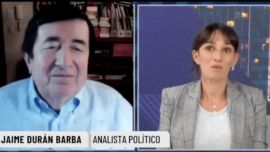






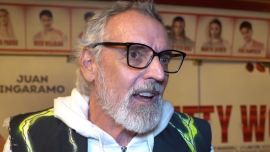
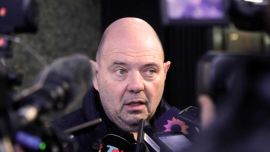
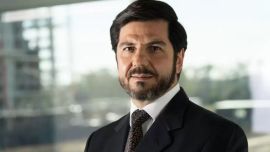
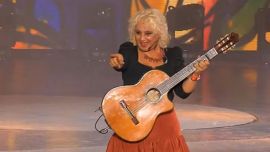
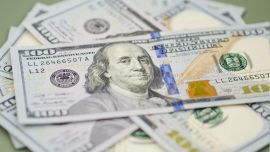
Comments